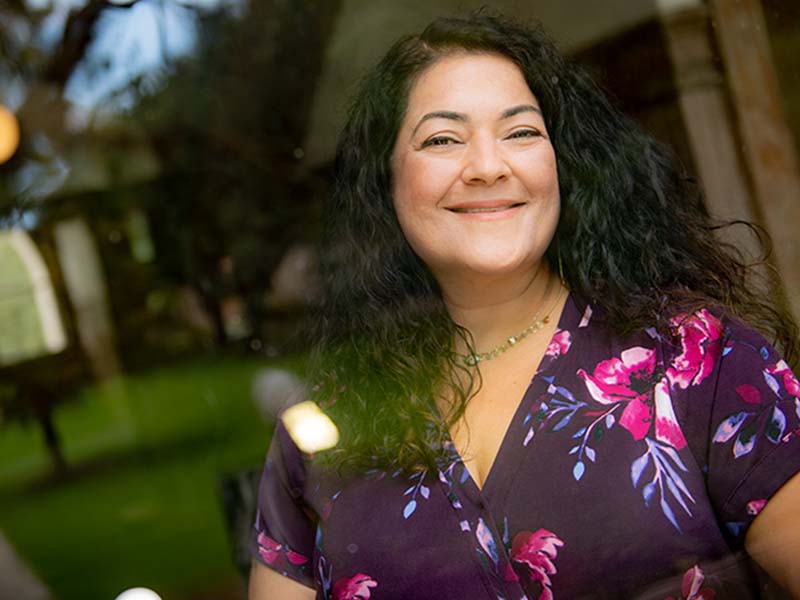Q&A with new Tulane Chief Diversity Officer Anneliese Singh (NC ’91)
By Roger Dunaway
This article was originally published in Tulane Today on July 20, 2020.

New Orleans native and Tulane alumna Anneliese Singh has returned to her hometown to become Tulane University’s first Associate Provost for Diversity and Faculty Development. (photo by Paula Burch-Celentano)
What attracted you to this position?
As a New Orleanian and Tulane graduate, this feels like an exciting new opportunity and phase in my life to come back home and do the work I love. I am excited to become a part of the social change network that already exists at Tulane and collaborate to move these efforts forward. I believe that Tulane is ready to break new ground as a campus and ask important questions about historical, institutional and interpersonal conditions that continue inequity for many of our community members. These are the questions that have been vitally important to me and have guided my research and life’s work. The creation of a Chief Diversity Officer (CDO) position at Tulane sets an explicit goal for building a culture that actively engages the most challenging issues in our society – from racism, sexism and heterosexism to ableism, classism, xenophobia and more. I am thrilled to be a part of building this Tulane culture.
What is your vision for this (new) role at Tulane?
My vision for this inaugural role is guided by the values I place on being collaborative and relational, so everything I do will flow from these values. In the true spirit of social change, I want to collaborate on a shared vision for our equity and justice work with students, staff, faculty and administrators. Building a community is central to my vision. Diversity, equity and inclusion (DEI) work is some of the most challenging and important work we can do in our lifetimes. We need one another in this work, and more so, we need strong relationships with one another where we can share the truth of our lived experiences, challenge one another and be accountable to our DEI values. ‘Diversity, equity and inclusion’ are static words if they are not values grounded in the context of history and then placed into direct action to produce real-world social change. The relationships we build at Tulane must have the capacity for courageous conversations and actions that lead to meaningful institutional changes in which we can all grow, change and thrive.
Is this the best or most difficult time to be a Chief Diversity Officer?
This has the potential to be the best time to be a CDO because there is so much readiness for change as a result of a series of injustices we have seen play out nationally and internationally. As Tulane and New Orleans community members, we have the opportunity to act on that readiness and create transformational change right now. History will not forget the bold actions and risks we took to challenge oppression. History will also remember the status quo we decided not to question. For instance, at the very beginning of the pandemic, we in higher education had opportunities to reevaluate how well we were serving campus members living with disabilities and our aging communities, as well as the black, indigenous and people of color (BIPOC) communities who were experiencing the most detrimental impacts of COVID-19. In addition, the protests after the murders of Breonna Taylor, Ahmaud Arbery, George Floyd, Tony McDade, Riah Milton and many others gave us an ethical mandate and gut-check to see if we can meaningfully say “Black Lives Matter” and show this through our everyday interactions, decision-making, practices, policies and procedures at Tulane. All of this requires a deep cultural shift in how we think about social change and our purpose as Tulane community members.
How has the current national conversation regarding police brutality and systemic racism changed and challenged your position?
As a non-Black Person of Color, I feel that I am more clear than ever about my role in addressing the anti-Black racism and xenophobia that drives not only police brutality and systemic racism, but also influences educational, healthcare, housing, legal and financial inequities for BIPOC people. I have personally changed by deepening my reflections on how I benefit from these systems through light-skinned advantage, and I have new accountability networks to keep me honest in my efforts. I am trained as a counselor and psychologist who studies the trauma and resilience of queer and trans folx of color have in the face of oppression. The neurobiology and science behind racism and interlocking oppressions is an integral part of my work. As a result of this national conversation, I have been integrating more attention to how racial trauma lands in the body for BIPOC people and white people in very different ways across multiple generations. We have to address this internalized racial trauma, so the work we do to develop anti-racist policies and procedures at Tulane must be intentional and sustainable to truly transform our culture.
How will you balance the needs/priorities of various marginalized groups on campus, including BlPOC, LGBTQ+ and those from ethnic or religious minorities?
I believe in centering the needs of BIPOC, LGBTQ+ and other communities who have experienced historical and institutional oppression in everything we do. Focusing on these needs means we are constantly examining the impact of our decisions and actions on groups that have experienced historical oppression and creating conditions that counter this experience at Tulane. This is crucial because the majority of leadership in higher education has not typically been from and often is not from BIPOC, LGBTQ+, ethnic or religious minorities. This means we all need daily DEI practices to help us deconstruct our socialization, so our decisions and actions are grounded, developing a more equitable and just campus. Research shows us that communities on the margins experience similar oppressive interactions on campus that they experience in a larger society. We have the opportunity and power to change these experiences at Tulane. DEI research can be a guide, as there is a wealth of ways we can develop affirming and empowering learning environments.
What do you see as the greatest obstacles to creating a truly diverse, inclusive and welcoming community at Tulane?
The obstacles to equity and justice work are many. Tulane is a predominantly white campus, and this means we have to examine how internalized whiteness shapes what we value and do as community members. With diversity and inclusion, there are important questions to ask at Tulane of “Diverse from what norm?” and “Who is doing the including?” Equity gives us a persistent vision to develop equity indicators that keep us accountable to dismantling institutional obstacles with our everyday decision-making. Equity also encourages us to ask – what would a Tulane culture feel like and be like if developing anti-racist practices and challenging other injustices become a key part of what it means to be a Tulane and New Orleans community member? What kind of leaders and leadership would we provide for the world if this were true? When we have shared commitments to building this type of Tulane culture, then we can use our privilege and advantage to create environments through our actions where people experience everyday value and belonging as community members.
What are some of the first actions you plan to take in your new role at Tulane?
Listening with cultural humility is my first action. I want to listen to new partners and long-standing social justice champions, both on and off-campus, so I can learn what has been helpful and less helpful in DEI work at Tulane so far. In his June 12 message, “A Plan for Tomorrow,” President Michael Fitts outlined several important steps he would like us to immediately take in developing an anti-racist culture at Tulane, including racial equity education, community discussions, increased support for BIPOC students and increased staff diversity. I am excited to be a part of these efforts and to think deeply about how we can challenge anti-black racism and other oppressions on campus. As we approach the 15th anniversary of Hurricane Katrina, I want to pause and consider what we have learned about the inextricable link Tulane and New Orleans have in our shared commitments to reducing the harm of injustices. In this way, I believe we can elevate Tulane’s motto of “not for one’s self, but for one’s own” even further to, at its core, include the role we each play in working for equity and justice in the world.
How will your status as a Tulane graduate and native New Orleanian inform your efforts?
Growing up mixed-race, Sikh and queer in New Orleans taught me about the brutality of oppression, but also the possibility of freedom and liberation. I trace the beginnings of my community organization to the very first classes I had at Tulane University in the political science and women’s studies departments. So, New Orleans and Tulane helped me find my voice and commitments to social change and my place in the world. I want my efforts as a CDO to do the same for others. I believe in the power we have as Tulane community members to make equity and justice work in a more regular practice of our everyday lives, and this belief will inform all that I do.
